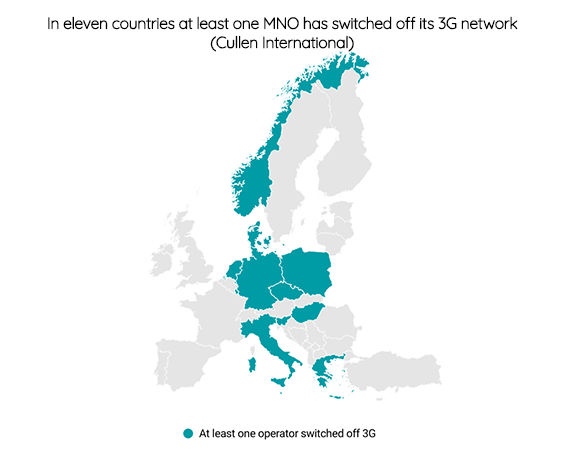In Europe, many mobile network operators (MNOs) have completed or plan to switch off their 2G or 3G networks.
Cullen International’s latest European benchmark shows that, in 11 out of the 31 researched countries, at least one MNO has switched off its 3G network.

In Switzerland, France and the Netherlands, at least one MNO has switched off its 2G network.
The switch-offs are generally not regulated but commercially‑driven, allowing operators to:
- use the spectrum for 4G and 5G technologies; and
- generate network cost savings through lower network maintenance costs.
One of the reasons for the continued use of legacy mobile networks is that they are still used, especially 2G networks, for machine-to-machine (M2M) services, such as smart meters.
BEREC, the assembly of European telecoms regulators, introduced in June 2023 its draft report on the practices and challenges of the phasing out of 2G and 3G networks. The draft report is not a policy recommendation but about current business practices and regulators’ experiences.
Cullen International provides similar information on 2G/3G network switch-offs in its benchmarks covering the Americas and MENA regions.
To access the full European benchmark, please click on “Access the full content” - or on “Request Access”, in case you are not subscribed to our European Telecoms Service.
more news
06 February 26
The DNA explained: deadlines set for copper switch-off, but with exceptions
Cullen International is issuing a series of analyses on different aspects of the Digital Networks Act (DNA) proposal. This report covers copper switch-off.
06 February 26
The DNA explained: no major overhaul of SMP access rules
Cullen International is issuing a series of analyses on different aspects of the Digital Networks Act (DNA) proposal. This report covers SMP access rules.
05 February 26
Revised Cybersecurity Act (CSA2) - mechanism to restrict high-risk ICT suppliers in critical sectors
Cullen International published an analysis of the proposed provisions to restrict high-risk suppliers (HRS) under the revised Cybersecurity Act (CSA2) delivered by the European Commission on 20 January 2026.